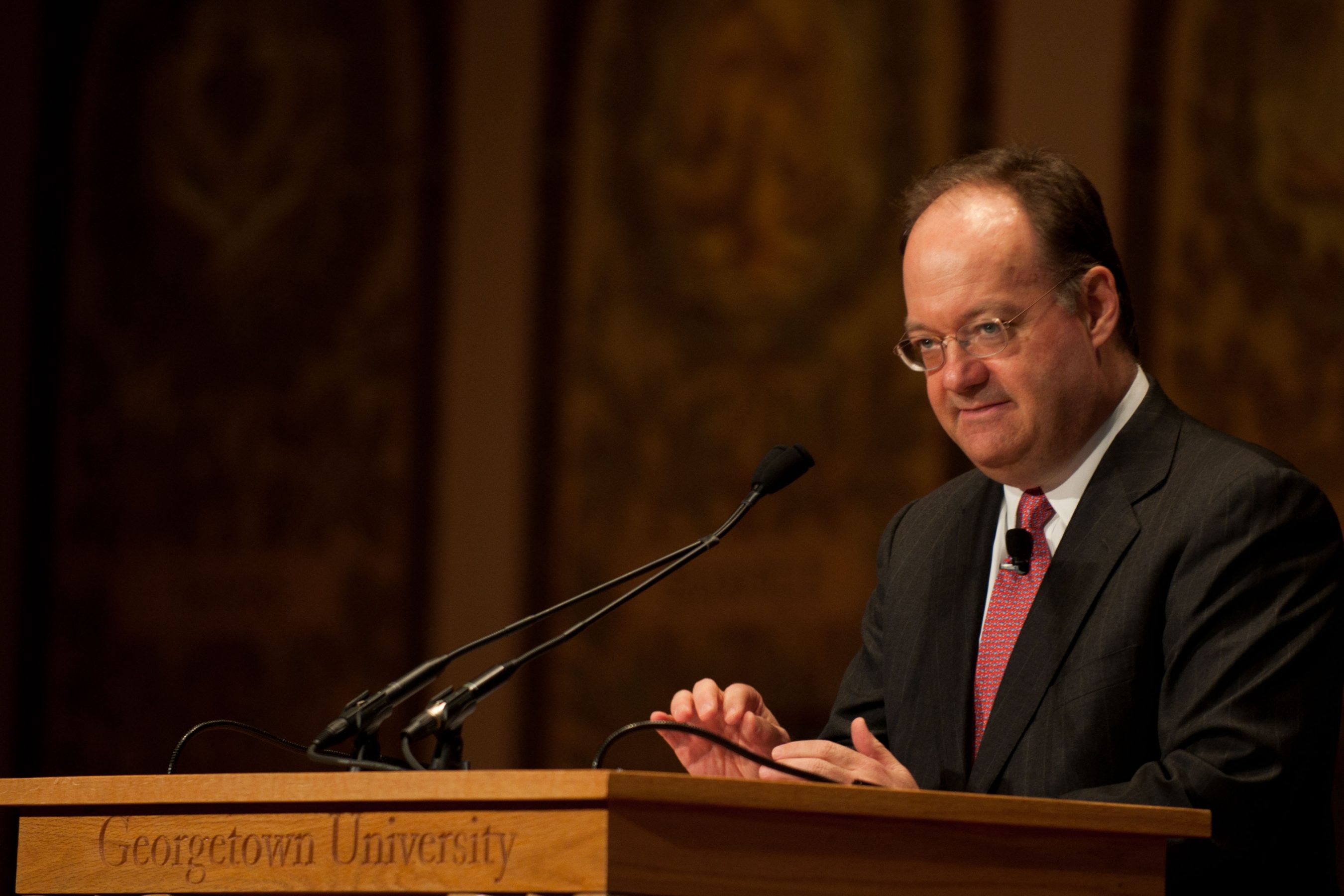A little over a week ago, President John DeGioia appeared on a panel with Ta Nehisi Coates and Drew Faust, Harvard University’s president, as part of the Atlantic’s Washington Ideas Forum. Coates’ segment,“An Evening with Ta Nehisi Coates”, centered around questions of culture, race, and politics. The conversation with Degioia and Faust explored the recent administrative and policy maneuvering both universities have undergone in the last year to try to come to terms with the varying degrees and roles the institution of slavery played in the two universities specifically, and in the country more broadly.
DeGioia described the 1838 sale as a “tragic moment” in our university’s history and outlined what steps the university has taken in its effort to “try to come to terms with” its role in slavery. In other words, he said the things we’d expect him to say: that slavery was horrible, that Georgetown’s participation in it was horrible, but that the university is doing all it can—through the renaming of buildings and implementation of preferential admissions—to reconcile this immense wrongdoing.
Coates, perhaps out of a respect for or recognition of the fact that DeGioia and Faust wouldn’t and couldn’t respond well to his normal haranguing of those with whom he disagrees, didn’t press DeGioia. However, he asked one question that illuminated, yet again, Degioia and Georgetown University’s shortcomings on the question of reconciliation: “One of the immediate arguments I heard from that was fine, that’s a great step, but what about actual cash support for those students who might take advantage of that?”
DeGioia responded: “So again, it gets a little bit lost in the complexity of financial aid at universities, but we’re one of 25 institutions [that are] need blind and meet full need for all of our students. So of course, we’ll continue that for [preferred admissions] students, for all students.”
This response, a symbol for the university’s stance on this question in the past weeks, is undergirded by a notion not of historical, material, and economic understanding, but instead by a willingness to overlook and downplay the tangible reality of Georgetown’s active support of the institution of slavery. Earlier in the conversation, DeGioia explained to Coates that the 1838 sale of “272 children, women, and men…amounted to $115,000 in 1838,” a figure roughly equal to $3.3 million today; more specifically, Georgetown, as of the information available today, directly received $17,000 to $25,000 of that sale, equivalent to around $500,000 in today’s terms. He went on to say, “we didn’t think that number was a relevant number for us because, as we’ve unfolded in our work in this process, we recognize far deeper commitments that we are making and are prepared to make.”
I agree: the specific number fails to reflect the moral and material import of the situation in whole. But the fact that it is a tangible, specific, knowable number does.
So often, those of us who see the foundation of our nation built upon the backs of an enslaved race of people see it, understandably and correctly, as a—or, perhaps more fittingly, the—moral disaster of unmatchable magnitude. Of course, this is all true. But what is lost in this moral reckoning is an acknowledgement of the material destruction of black America that built white America; quite literally through unpaid labor from slavery, convict leasing, to today’s prison labor, but also through Jim Crow, redlining and other housing discrimination, job discrimination, stripping voting and due process rights, denying healthcare—part of an endless list of pernicious 20th century measures.
Potentially, but unjustifiably, we fail to acknowledge this material under the guise of impracticality, of scope, of immense complexity. In the Georgetown narrative, even those arguments, in all their intellectual and moral flaw, hold no weight. We know the numbers and have records of the finances. We documented the list of 272 names. We have found, and have laudably continue to dedicate resources to finding, many of the descendants of this list. No excuse exists.
I’m willing to give President DeGioia, in his mentioning of “deeper commitments” than the specific financial figure that the sale entailed, the benefit of the doubt that what he was referring to was a moral and spiritual reconciliation Georgetown needs to make with its past and with the descendants of those it put through hell in 1838. That reckoning is understandable and ambitious, particularly within the framework of Georgetown’s Jesuit and Catholic identity. However, what I think DeGioia and the university have failed to understand is that that position is untenable. Their morality must be founded in an effort to atone for the economic plunder this university actively participated in to finance its very survival. We cannot hide behind our status as a need blind university, or under the guise that every student’s financial situation or aid apropos to Georgetown is the same. The difference, the specificity, the uniqueness is the point. Lumping together people of all colors whose ancestors were not directly the victims of economic and humanistic destruction does not and cannot atone for our sin.
In 1838, those Jesuit Priests in Maryland chose to have slaves, to buy them, and to sell them. Those choices had real consequences, beyond being wrong or misaligned with a present day understanding of Jesuit morality. Those Jesuits decided to change forever the trajectory of the lives of 272 real people, who had lives and children and interests and breaths and heartbeats; to support a system of oppression in every aspect of the word; to limit and segregate the material choices those 272 people and every generation of their offspring could make about where they lived, what education, healthcare, and job they got, and fundamentally what freedom they could enjoy.
Until we, Georgetown University, the sole living embodiment of those decisions, decide to make our own decisions, whose economic and material severity matches that of our Jesuit ancestors, we will never undergo the moral, spiritual, or “deeper” reconciliation we talk so desperately about wanting.
Isaiah is a sophomore in the School of Foreign Service. He writes the column, Hidden Hegemony, for the Voice.





